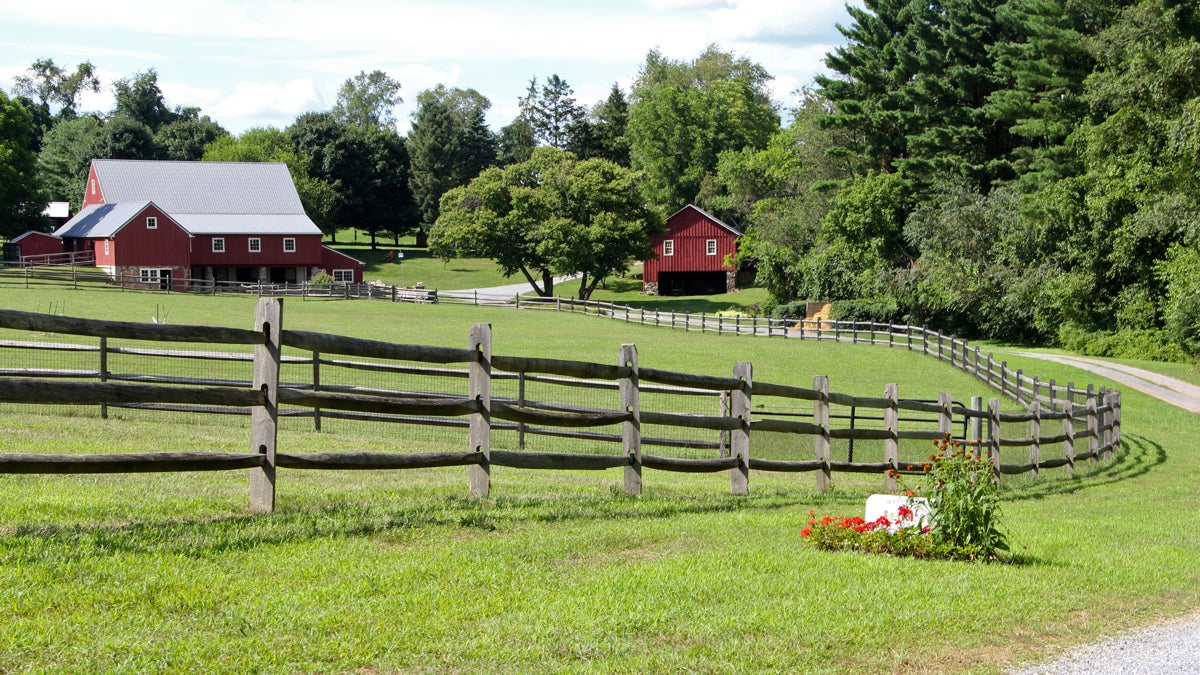Use restrictions may force closure of Chester County farm center for kids with disabilities
Listen
The Barn at Springbrook Farm in West Chester, which provides a camp for children with disabilities, is threatened with closure. The driveway is one of the 33 contested zoning and usage points. (Emma Lee/WHYY)
A zoning dispute threatens to close the Barn at Spring Brook Farm, an animal-assisted therapeutic facility for children with disabilities, most of them with autism, in Chester County.
Around 100 people gathered in an elementary school gym for a Pocopson Township supervisors meeting on July 16 where each side got to weigh in on the fate of the Barn. On Monday, the supervisors will decide whether to grant the Barn an extension to comply with the 33 conditional use restrictions the township has ordered.
At the meeting neighbors, including Matt Murphy, raised concerns about capacity and conforming to building standards.
“As far as the Barn’s concerned, I don’t think it’s an issue of taking care of these kids, but I do think it’s a little too late. Having one bathroom on the farm, I think they should have thought before they took on these kids,” he said.
Structural changes, such as adding a bathroom and an ADA-compliant ramp to the second-floor barn loft, were part of the conditions. Others related to use of the grounds.
But advocates for the Barn say the enforcement of these conditions is selective, and unfair. Resident Randy Mims pointed out one particular example of lax zoning.
“When there is a tractor repair workshop right across from the township that’s zoned residential and it’s been there for years, and I’ve complained about it, but we’re beating up on Mary Beth?” he said. “We should be ashamed.”
Mary Beth Drobish founded the Barn in 2006.
Dan Stark, executive director of the Barn, spoke at length about changes the organization has already made to its facilities, such as adding an opaque fence on the northern border of the property and moving parking to a different part of the parcel, and why it had not yet filed a formal appeal over certain state building code violations. He said that the board wanted to know that there would be enough time to work on a sustainable plan for growth before making the investment needed to go through that process.
Finally, some of the township’s conditions addressed the permissible number of clients and fundraising events. For example, they call for capping the number of individual sessions at three children per day during the summer, and the number of campers at enrolled at Camp Geronimo at 16 children per day.
Stark says it doesn’t make sense to spend money meeting some conditions while others restrict the Barn’s ability to be financially sustainable.
“We now believe we could likely raise the funds to come into compliance with the ruling,” he said, adding that grant funders want to see more kids being served, not fewer, so the restrictions on capacity make it hard to justify the expense of modifying the structures.
“When we testified at the conditional use hearing, we came up with a number based on our current experience … and then [the supervisors] actually restricted our current use,” he said. “If we’re going to invest that kind of money, we need to sustain operations for three to five years.”
Saying goodbye
While Monday night may or may not be the final word, some children who frequent the Barn have started making peace with its closure.
Jennifer Lane’s son Josh was diagnosed with autism at 18 months. She credits the Barn with teaching him social skills in a low-pressure environment.
“When he first started, his goal was just to make eye contact and touch the animals … now he’s cleaning hooves. To work that tool with fine-motor skills solidified the progress he made,” said Lane.
But she said Josh recently said goodbye to the Barn’s animals, which include miniature horses, goats and a pot-bellied pig. in anticipation of its end date. He even tried to give money from his own pocket to keep it going.
“Josh asked if he could donate some of his birthday money,” Lane said. “For a kid that doesn’t get social implications, it must really touch him to the core.”
Representatives for the Barn were pessimistic about their ability to stay in business in the short term. In a letter circulated on June 11, the board stated it would “cease operations” on Aug. 31 — and it has not issued another announcement.
The nonprofit has about 150 kids enrolled in its camp and individual sessions this year. Chester County is home to more than 600 children with autism under the age of 17.
WHYY is your source for fact-based, in-depth journalism and information. As a nonprofit organization, we rely on financial support from readers like you. Please give today.

